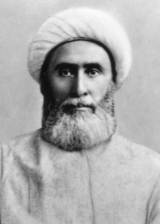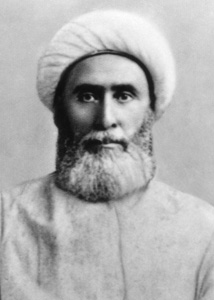
Ibn-i-Abhar
Encyclopedia

Bahá'u'lláh
Bahá'u'lláh , born ' , was the founder of the Bahá'í Faith. He claimed to be the prophetic fulfilment of Bábism, a 19th-century outgrowth of Shí‘ism, but in a broader sense claimed to be a messenger from God referring to the fulfilment of the eschatological expectations of Islam, Christianity, and...
, the founder of the Bahá'í Faith
Bahá'í Faith
The Bahá'í Faith is a monotheistic religion founded by Bahá'u'lláh in 19th-century Persia, emphasizing the spiritual unity of all humankind. There are an estimated five to six million Bahá'ís around the world in more than 200 countries and territories....
, a global religion of Persian origin. He was appointed a Hand of the Cause
Hands of the Cause
The Hands of the Cause of God, Hands of the Cause, or Hands were a select group of Bahá'ís, appointed for life, whose main function was to propagate and protect the Bahá'í Faith...
, and identified as one of the nineteen Apostles of Bahá'u'lláh
Apostles of Bahá'u'lláh
The Apostles of Bahá'u'lláh were nineteen eminent early followers of Bahá'u'lláh, the founder of the Bahá'í Faith. The apostles were designated as such by Shoghi Effendi, the Guardian of the Bahá'í Faith, and the list was included in The Bahá'í World, Vol...
.
Background
Ibn-i-Abhar (Arabic ابن ابهر)was born in the village of AbharAbhar
Abhar is a city in and capital of Abhar County, Zanjan Province, Iran. At the 2006 census, its population was 70,836, in 19,136 families.Abhar is located between Qazvin and Zanjan, near the Abhar River. It is the second-largest city in the province after Zanjan...
. His father came from a family of the leading Islam
Islam
Islam . The most common are and . : Arabic pronunciation varies regionally. The first vowel ranges from ~~. The second vowel ranges from ~~~...
ic clergy of the village, and became a Bábí after reading some of the writings of the Báb
Báb
Siyyid `Alí Muḥammad Shírází was the founder of Bábism, and one of three central figures of the Bahá'í Faith. He was a merchant from Shíráz, Persia, who at the age of twenty-four claimed to be the promised Qá'im . After his declaration he took the title of Báb meaning "Gate"...
. Due to the persecution which followed, the family moved to Qazvin, and in 1868 became followers of Bahá'u'lláh, who claimed to be the messianic figure of which the Báb had foretold.
Travels
In 1874 his father was poisoned. He began travelling to different parts of IranIran
Iran , officially the Islamic Republic of Iran , is a country in Southern and Western Asia. The name "Iran" has been in use natively since the Sassanian era and came into use internationally in 1935, before which the country was known to the Western world as Persia...
, where he taught many in the Bábí community who accepted Bahá'u'lláh. His teaching, however, led to a fourteen-month imprisonment. After his release, he continued travelling throughout Iran, and in 1886 made a trip to ‘Akká
Acre, Israel
Acre , is a city in the Western Galilee region of northern Israel at the northern extremity of Haifa Bay. Acre is one of the oldest continuously inhabited sites in the country....
. That same year he became one of the four Hands of the Cause
Hands of the Cause
The Hands of the Cause of God, Hands of the Cause, or Hands were a select group of Bahá'ís, appointed for life, whose main function was to propagate and protect the Bahá'í Faith...
appointed by Bahá'u'lláh, and began travel-teaching outside of Iran, to Caucasia, Turkmenistan
Turkmenistan
Turkmenistan , formerly also known as Turkmenia is one of the Turkic states in Central Asia. Until 1991, it was a constituent republic of the Soviet Union, the Turkmen Soviet Socialist Republic . Turkmenistan is one of the six independent Turkic states...
, and India
India
India , officially the Republic of India , is a country in South Asia. It is the seventh-largest country by geographical area, the second-most populous country with over 1.2 billion people, and the most populous democracy in the world...
.
From 1890 to 1894 he was imprisoned in a dungeon in Tihrán, actually wearing the same chains that once were used on Bahá'u'lláh while a prisoner there.
After his release in 1894, he again travelled to ‘Akká, and then to ‘Ishqábád. In 1897 he participated in the gathering which led to the formation of the Central Spiritual Assembly of Tihrán, which later became the National Spiritual Assembly
Spiritual Assembly
Spiritual Assembly is a term given by `Abdu'l-Bahá to refer to elected councils that govern the Bahá'í Faith. Because the Bahá'í Faith has no clergy, they carry out the affairs of the community...
of Iran.
In 1907 he travelled across India with Mírzá Mahmúd-i-Zarqání and two American Bahá'ís, Harlan Ober and Hooper Harris.
Throughout his life he was able to visit the Holy Land
Holy Land
The Holy Land is a term which in Judaism refers to the Kingdom of Israel as defined in the Tanakh. For Jews, the Land's identifiction of being Holy is defined in Judaism by its differentiation from other lands by virtue of the practice of Judaism often possible only in the Land of Israel...
eleven times, and travelled extensively inside Iran
Iran
Iran , officially the Islamic Republic of Iran , is a country in Southern and Western Asia. The name "Iran" has been in use natively since the Sassanian era and came into use internationally in 1935, before which the country was known to the Western world as Persia...
, passing away in 1917.

